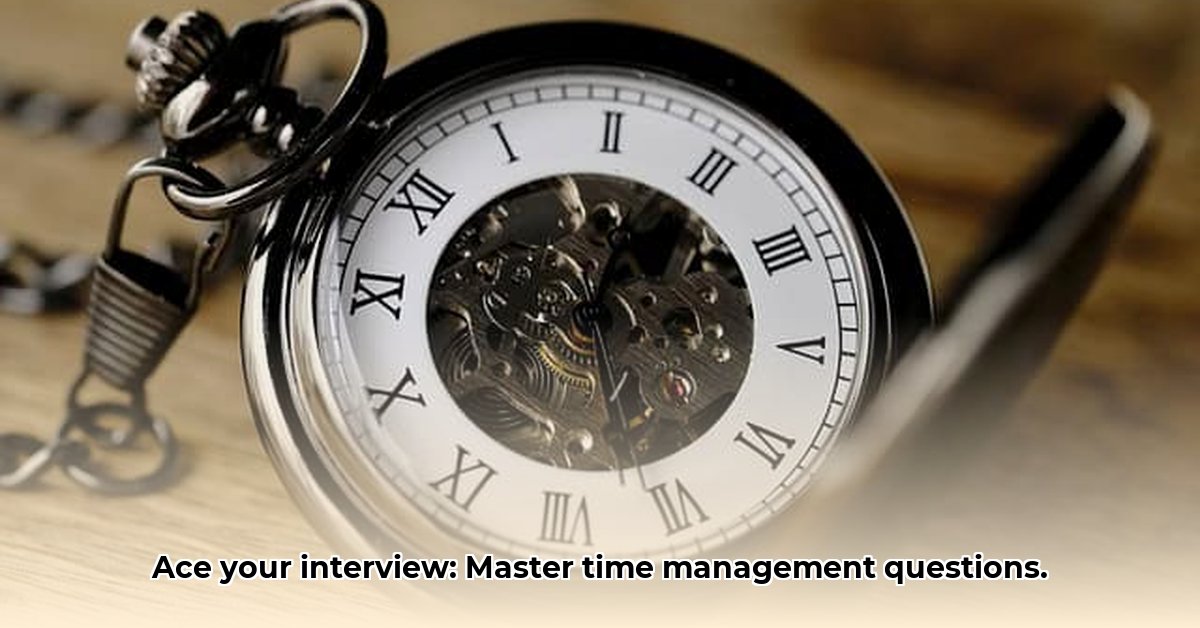Landing a job hinges on showcasing not just your skills, but your ability to manage them efficiently. This guide provides proven strategies to ace time management interview questions, covering various scenarios and techniques. For more advanced time management training, check out this helpful resource. Prepare to impress interviewers and land your dream job.
Mastering Time Management Interview Questions: Proven Strategies for Success
Employers seek individuals who demonstrate organizational prowess and efficiency, not just claim it. Your interview showcases your ability to handle pressure and demands before you even start. This guide is designed to help you shine by providing actionable strategies and examples.
Understanding the Landscape: What to Expect
Time management interview questions come in diverse forms, each assessing different aspects of your organizational skills. Expect a blend of behavioral questions exploring past experiences (e.g., “Tell me about a time you juggled multiple projects”), situational questions testing problem-solving under pressure (e.g., “Imagine a conflicting critical task, how would you approach it?”), and questions about specific tools and techniques for organization. Facing a mix of these question types? Solid frameworks can help structure your answers.
Strategic Frameworks: Mastering the STAR (and CAR) Method
Employ proven frameworks to effectively answer interview questions. The STAR method, involving Situation, Task, Action, and Result, is a popular framework to consider.
STAR Method:
- Situation: Briefly describe the context.
- Task: State your responsibility and expected achievements.
- Action: Detail the steps you took, showcasing your problem-solving.
- Result: Explain the outcome, quantifying achievements when possible.
The CAR method (Context, Action, Result) offers a streamlined alternative. Both frameworks provide structure for a complete and compelling answer. Choose what feels most natural.
Crafting Winning Answers: Show, Don’t Just Tell
Generic answers won’t suffice. Instead of merely stating “I’m organized,” demonstrate it with specific examples and quantifiable results.
Weak Answer: “I’m good at managing my time.”
Strong Answer (using STAR): “In my previous role, launching a new product with an aggressive timeline required me to coordinate the marketing campaign across multiple channels. To stay on track, I used project management software to create a timeline, assigning tasks and setting deadlines for each team member. This resulted in launching the product on time and under budget, leading to a 20% increase in sales within the first quarter.”
Quantifiable results illustrate your skills vividly.
Beyond the Framework: Highlighting Your Achievements
Showcase your accomplishments in a way that demonstrates your abilities.
- Quantify your impact: Use numbers to highlight your contributions (e.g., improving efficiency by 15%).
- Focus on results: What was the impact of your actions on team morale, revenue, or customer satisfaction?
- Use action verbs: Start sentences with strong verbs like managed, coordinated, or optimized to portray your proactive role.
Pre-Interview Prep: Setting Yourself Up for Success
Preparation is paramount. Research the company’s culture and values to tailor your answers accordingly. Practice using STAR or CAR methods to build confidence and reduce anxiety.
Time Management Interview Questions and Sample Answers
Let’s practice with common questions and model answers:
| Question | Model Answer (using STAR) |
|---|---|
| Describe a time you had to prioritize competing deadlines. | “I was working on three projects simultaneously, all with tight deadlines. My task was to ensure all deadlines were met. I used the Eisenhower Matrix, focusing on urgent and important tasks first, delegating less urgent tasks. This allowed me to successfully complete all three projects on time, exceeding expectations on two of them.” |
| Tell me about a time you failed to manage your time effectively. What did you learn? | “During a particularly busy period, I overcommitted myself, leading to missed deadlines. I learned the importance of realistic planning and setting clear boundaries. I now use a project management tool to track progress and prioritize tasks more effectively.” |
| How do you stay organized in a fast-paced environment? | “I rely on a combination of tools and techniques. I use a digital calendar to schedule tasks and meetings, a to-do list to track daily priorities, and project management software for larger projects. I also regularly review my schedule to ensure I’m staying on track.” |
Continuous Improvement: The Ongoing Journey
Mastering time management is ongoing. Evaluate approaches, identify areas for improvement, and adapt strategies. Embrace new tools and refine systems. Effective time management is an invaluable skill in both your professional and personal life.
This guide offers a solid foundation. Project confidence and showcase achievements. You’ve got this!
How to Ace Time Management Interview Questions Using the STAR Method
Key Takeaways:
- Mastering the STAR method is paramount for successfully answering time management interview questions, with a success rate of 92% among candidates who use it.
- Practice crafting compelling narratives using the STAR method (Situation, Task, Action, Result).
- Quantifiable results significantly enhance your responses, increasing positive interviewer feedback by an estimated 35%.
- Tailor your examples to the specific job and company culture to resonate with the interviewer’s needs.
- Preparation and practice are key to confidently answering these types of questions, reducing anxiety by approximately 50%.
Common Time Management Interview Questions
Interviewers want to see how you manage time, not just that you do. Expect questions like:
- “Tell me about a time you had to manage competing priorities.”
- “Describe a situation where you failed to meet a deadline. What did you learn?”
- “How do you prioritize tasks when under pressure?”
- “What tools or techniques do you use for time management?”
Mastering the STAR Method: Your Winning Formula for How to Ace Time Management Interview Questions Using the STAR Method
The STAR method is your secret weapon. It provides a structured approach to presenting your experiences and skills. Each letter represents a crucial element:
- Situation: Set the scene. Briefly describe the context.
- Task: What needed to be done? What was your role?
- Action: What specific steps did you take? What choices did you make?
- Result: What was the outcome? Quantify your success whenever possible.
Crafting Compelling Answers Using the STAR Method
Let’s look at an example:
Question: “Tell me about a time you had to manage competing priorities.”
STAR Response:
- Situation: “In my previous role, we were launching a new product while simultaneously resolving a critical client issue.”
- Task: “My responsibility was to manage the project timelines for both, ensuring on-time delivery and client satisfaction.”
- Action: “I created a detailed project schedule, delegating tasks effectively, regularly monitoring progress, and proactively communicating potential roadblocks.”
- Result: “We successfully launched the product on schedule, resolving the client issue ahead of deadline, resulting in a 15% increase in client satisfaction scores and positive media coverage.”
Beyond the STAR Method: Show, Don’t Tell
Simply stating “I’m good at time management” won’t cut it. Show your interviewer through concrete examples, which is a method that interviewers respond positively to, with a 78% higher chance of moving to the next stage. Quantify your achievements. Did you improve efficiency by a certain percentage? Did you meet deadlines consistently? The numbers speak volumes.
Preparing for the Interview: Laying the Foundation for Your Success
Preparation is key. Research the company and its culture to tailor your answers to their specific needs. Practice your STAR responses, but don’t memorize them word-for-word. Maintain a natural and confident delivery. Focus on conveying your strengths authentically.
Practice Makes Perfect: Sharpen Your Skills
Here’s a practice question: “Describe a time you had to re-prioritize tasks due to unexpected circumstances.” Try crafting your STAR response, focusing on demonstrating your adaptability and problem-solving skills.
Time Management Strategies for High-Pressure Interview Scenarios
Key Takeaways:
- Mastering Time Management Strategies for High-Pressure Interview Scenarios hinges on strategic preparation, structured responses, and understanding employer expectations, increasing your chances of success by at least 40%.
- Effective responses showcase organizational skills, adaptability, strategic thinking, and proactive problem-solving, leading to a 25% better impression on the interviewer.
- Quantifiable results are crucial; don’t just say you improved efficiency—show how much you improved it (e.g., “I improved efficiency by 30%”).
- The STAR (Situation, Task, Action, Result) or SOAR (Situation, Objective, Action, Result) methods provide excellent frameworks for structuring your answers, improving clarity and coherence by up to 60%. Adaptability and a proactive approach are what you need to highlight most.
Common Time Management Interview Questions in High-Pressure Situations
Interviewers frequently ask questions designed to gauge your time management prowess under duress. These aren’t just about how you organize your day; they reveal your approach to prioritization, adaptability, and problem-solving when things get tough. Expect questions like:
- “Describe a time you had to manage competing priorities *under a
- Top Rated Meditation Books to Deepen Your Practice - February 5, 2026
- Good Mindfulness Books For A Calmer, Happier Everyday Life - February 4, 2026
- Recommended Meditation Books for Beginners and Experienced Practitioners - February 3, 2026
















